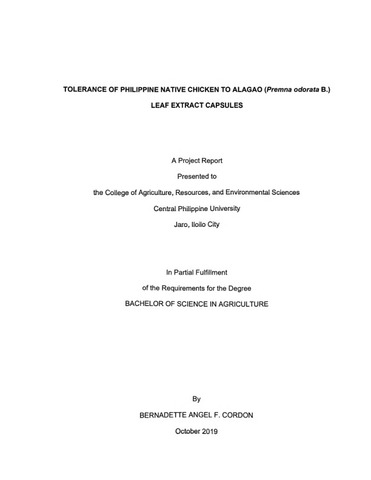Показать сокращенную информацию
Tolerance of Philippine native chicken to alagao (Premna odorata B.) leaf extract capsules
| dc.contributor.adviser | Cabarles, Jaime Jr | |
| dc.contributor.author | Cordon, Bernadette Angel F. | |
| dc.date.accessioned | 2021-07-12T07:55:35Z | |
| dc.date.available | 2021-07-12T07:55:35Z | |
| dc.date.issued | 2019 | |
| dc.identifier.citation | Cordon, B. A. F. (2019). Tolerance of Philippine native chicken to alagao (Premna odorata B.) leaf extract capsules (Unpublished Special paper). Central Philippine University, Jaro, Iloilo City. | en_US |
| dc.identifier.uri | https://hdl.handle.net/20.500.12852/1180 | |
| dc.description | Abstract only | en_US |
| dc.description.abstract | Nowadays, medicinal plants used in treating animals are falsely considered to be safe without any further information on its health effects. Medicinal plants are usually used by farmers and there is a lack of control and review in terms of dose, manner and frequency of administration. Therefore, evaluating the toxicological effects of any plant extract are intended to be used in animals to know its potential toxic effects. This study aimed to determine the tolerance of Philippine native chicken to alagao leaf extract in capsule form. Specifically, this study aimed to determine the right oral dose of Premna odorata B. leaf extract that can be tolerated in capsule form and the signs and symptoms of over dosage in Philippine native chicken. Any changes were recorded through photos or videos and were noted upon administering the capsule. Twenty-four native chickens were introduced with four different dosage allocating 6 chickens for each set The first set of chickens were administered with a base dose of 300 mg ALE capsules, the second set with 500 mg ALE capsule and the third set with 1000 mg ALE capsules and last set of test chickens with 2000 mg ALE capsule. The birds were observed individually with their respective treatment dosage during the first 30 minutes then periodically for every 4 hours within the 24-hour test Based on the results of the four sets of chickens given with different dosages does not show any signs and symptoms of toxicity. The test also revealed that the chickens survived even the highest dose of 2000 mg indicating that the ALE is likely to be nontoxic. | en_US |
| dc.format.extent | v, 19 leaves | en_US |
| dc.language.iso | en | en_US |
| dc.rights | Attribution-NonCommercial-NoDerivs 3.0 Philippines | * |
| dc.rights.uri | http://creativecommons.org/licenses/by-nc-nd/3.0/ph/ | * |
| dc.subject.ddc | Filipiniana Theses 630.72 C812 | en_US |
| dc.subject.lcsh | Toxicology | en_US |
| dc.subject.lcsh | Plant extracts | en_US |
| dc.subject.lcsh | Plant extracts--Toxicology | en_US |
| dc.subject.lcsh | Chickens | en_US |
| dc.title | Tolerance of Philippine native chicken to alagao (Premna odorata B.) leaf extract capsules | en_US |
| dc.type | Special paper | en_US |
| dc.description.bibliographicalreferences | Includes bibliographical references | en_US |
| dc.contributor.committeemember | Patricio, Hope G. | |
| dc.contributor.department | College of Agriculture, Resources and Environmental Sciences | en_US |
| dc.description.degree | Bachelor of Science in Agriculture | en_US |
| local.subject | Alagao | en_US |
| local.subject | Premna odorata--Toxicology | en_US |
| local.subject | Native chicken | en_US |
| local.subject | Alagao--Toxicology | en_US |
| local.subject.scientificname | Premna odorata | en_US |
| local.subject.scientificname | Gallus gallus | en_US |



